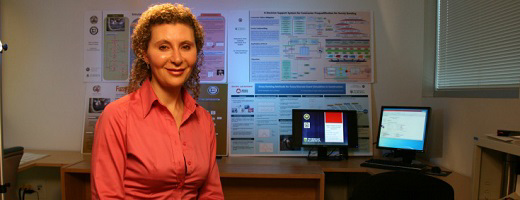Ledcor Graduate Scholarchips in CEM Awarded at University of Alberta
September 28, 2016

The Ledcor Professorship in Construction Engineering and Management was first announced in August, 2008. The $500,000 contribution to the Department of Civil & Environmental Engineering at the University of Alberta established an endowed professorship in the Department of Civil and Environmental Engineering, as well as funding between two to five undergraduate and two graduate scholarships in Construction Engineering and Management (CEM) annually.
The partnership between Ledcor and the University was established with the vision of improving methods and practices within the Canadian building construction industry. In Canada, and Alberta especially, innovations in the construction industry have far reaching benefits, as the province is projected to have the second highest investment in the country in non-residential construction from 2012-2020. The Department of Civil & Environmental Engineering at the university is instrumental to this industry, attracting and training future generations of engineers for careers where they are desperately needed. Ledcor’s hope is to enhance the department’s already strong reputation and to support the students and Alberta’s construction industry.
The two 2015 Ledcor Graduate Scholarships in CEM were awarded to Meimanat Soleimanifar and Nima Gerami Seresht.
During her master’s studies, Meimanat developed and improved a radio frequency-based positioning system for real-time localizing and tracking of pipe spools and fabrication processes inside a fabrication shop. During her PhD study, she has been working closely with JV Driver Projects Inc. through a collaborative research project. Meimanat has been monitoring the planning and execution of ongoing modular fabrication and construction projects, as well as critical decision-making processes in the industry in relation to developing and managing project schedules. This research has resulted in an outstanding journal paper, five conference papers, and a number of invitations to speak for various construction associations.
Nima’s research has focused on projected skilled labor shortages for Alberta’s construction industry. This study explored the career paths of tradespeople in the provincial construction industry, as these significantly affect future supplies of skilled labor. This study was conducted under the NSERC Industrial Research Chair in Strategic Construction Modeling and Delivery, held by Dr. Aminah Robinson Fayek. The research is already finalized and a journal paper was published in the Canadian Journal of Civil Engineering in 2014. Nima’s previous research has mostly focused on identification of key factors which influence productivity. To analyze the interactive relationship among factors, he proposed a dynamic system modeling approach to help the industry predict productivity in their projects with high accuracy.
Dr. Aminah Robinson Fayek is a tenured professor with the Department of Civil and Environmental Engineering at the University of Alberta. Since joining the Department in 1997, Dr. Fayek has become a respected member of Alberta’s construction industry and an internationally recognized expert in fuzzy logic and fuzzy hybrid modeling techniques for intelligent decision support in the construction industry. She holds the prestigious Ledcor Professorship in Construction Engineering, with a mandate to advance research, scholarships, and learning in the construction industry.
Dr. Fayek became the NSERC Associate Industrial Research Chair in Construction Engineering Management at the University of Alberta in 2007. As the Associate Chair, she developed a successful formula for collaborative research between the University and the construction industry. Currently, she is leading a team in developing hybrid decision support systems that incorporate fuzzy logic with other modeling techniques, such as artificial neural networks, genetic algorithms, and simulation. This approach quantifies the anecdotal knowledge gathered from industry experts, so that definite conclusions can be drawn.
Through Dr. Fayek’s work and the work of graduate students like Nima and Meimanat, construction industry professionals will be better equipped to address productivity, workforce management, project management, and contractor prequalification issues. The research has already led to the development of several valuable applications for the industry, including a contractor prequalification tool, a foreman skills development tool, and a workforce absenteeism tracking tool. With significant potential to change the ways in which the construction industry operates and comes to decisions, this research provides a more accurate and realistic representation of the human reasoning process, resulting in improved methods for the planning, structuring, forecasting, control, and evaluation of construction projects.